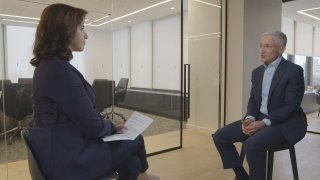
(Click here to subscribe to the Delivering Alpha newsletter.)
Even if the economy faces two quarters of contraction — the traditional definition of a recession — Josh Friedman thinks it's strong enough to withstand a more serious slowdown. Friedman is co-founder, co-chairman, and co-CEO of the $26 billion credit giant, Canyon Partners. He sat down with Leslie Picker to explain why he believes the markets "can tolerate a little bit of stress."
While a stronger economy means fewer opportunities for distressed investors like Friedman, he said his firm is prepared with "comprehensive shopping lists of securities" in other areas like secondaries, loan originations, and securitized packages.
Get San Diego local news, weather forecasts, sports and lifestyle stories to your inbox. Sign up for NBC San Diego newsletters.
(The below has been edited for length and clarity. See above for full video.)
Leslie Picker: I was looking back at our interview from January and at the time, you said we were at a fork in the road. From an economic and market standpoint, that prediction appears to be very prudent, given everything we've seen in the equity market sell-off, the fixed income sell-off, shift in monetary policy, geopolitical strife, and more over the last six months. It's definitely the epitome of a fork in the road. So, I'm just curious how you're sizing up the current environment, given what we've seen since we last spoke,
Josh Friedman: I think we have to start by looking at where we came from. When I last talked to you, I think it was the day that the market dropped something over 1,000 points and bounced back. And my basic comment was, well, things were just too expensive. Markets fluctuate. And a confluence of recovery from COVID supply constraint and excessive stimulus both from the Treasury and from the Fed caused quite an amount of over speculation and froth in almost every asset class that you could imagine - whether it was real estate cap rates, whether it was SPACs, whether it was equities, whether it was credit markets, where you had no interest, no spread, and still had credit risk. So, it was not surprising to see a pullback from that just on its own, because those things are always self-correcting. There's always some kind of a mean reversion. But now, we're in a little different place because the Fed underestimated so significantly the more embedded inflationary aspects that are in the economy. And that's kind of the fork in the road that we're at right now. Will there be an ability of the Fed to rein this in quickly? Will people's activities in response to the Fed's comments, cause that to happen by itself? Will there be enough demand destruction to contain inflation? Or maybe that'll happen all by itself, even without the Fed doing what it asserts that it will do.
Money Report
Picker: So, the fork in the road is essentially the debate that I think pretty much everybody is having right now is, will there be a soft landing or a hard landing? And will the Fed be able to accomplish the potential for a soft landing? And I'm just curious how you are looking at this from a probabilistic standpoint.
Friedman: I guess my view is the Fed sometimes gets given a little too much credit for everything that happens. The Fed announced that it was going to do all sorts of asset purchases. And yes, they bought treasuries and quantitative easing and so forth right after COVID. But a lot of the measures they announced actually never were effectuated. The market did it all by itself in response to knowing that the Fed was there to protect them. And now, knowing that the Fed is going to raise rates, the market started to do that by itself. People are starting to contain demand, supply is starting to be back in a little more equilibrium - not in every market, energy markets have unique problems that are sort of unique to the supply and demand in the energy transition - but I think sometimes the markets have a natural pull toward the center. It's very popular if you're in my seat to predict a hard landing because it's much more exciting, it makes you a better guest on shows like this. But, my general view is that unemployment is only three and a half percent, personal balance sheets are actually quite good, they can tolerate a little bit of stress in the system. The banking system has none of the stress that we saw in the global financial crisis. So, I think it's not just the Fed that has to engineer a slightly softer landing, I think the market will have natural forces that pull us toward the middle by themselves.
Picker: From a credit investor standpoint, this has obviously all shifted the risk profile of different aspects of the corporate capital structure. Where are you seeing the most opportunity right now? What is concerning to you, given just the recent sell-off we've seen across a lot of the credit market?
Friedman: We had a sea change in the opportunity range about the time when I last spoke to you, which I think was maybe late March, something like that. And since then, the high yield market has gotten decimated. June was the worst single month that we've seen in decades, with the exception of the immediate aftermath of COVID, which was gone like that, because the Fed bailed everyone out, which they're not doing this time.
Picker: And there wasn't even a recession in June, it was just the market.
Friedman: Correct. And so, we've seen the equity markets get destroyed down 20% to 30%, depending on which market you look at. We've seen the investment grade debt market get destroyed, we've seen the high yield market get destroyed. So, all of a sudden, bonds that were trading at par in the secondary market are trading at 80, 85, 78, 68. And liquidity isn't great, and high yield funds that were used to nothing but inflows in a declining interest rate environment have seen an awful lot of outflows. And again, there are ups and downs to this, but generally speaking, the first area of opportunity, in my view, is just secondary market. high yield credit that dropped 20 points, and there's lots of it, And it's not so very efficient in the market today. And a lot of people who used to play in that market have exited that market for a while, or at least they're out of practice, because they've been busy originating direct loans.
The second area, I would say, is origination of new loans will change quite dramatically. The banks were very eager to compete with a lot of the private direct lenders. And in their zeal to compete, they got stuck with a lot of paper on their balance sheet. So, number one, there's a process of helping relieve them of the burden of that capital at lower prices that seem to be quite attractive. And second of all, they're less likely to be as aggressive. This is how these cycles always end - they get a little too aggressive, they act as principals, and then they have an issue. But this isn't like 2008, when you had massively leveraged balance sheets, and lots and lots of paper that the banks had to relieve themselves of. This is more of a short-term effect, but it will keep them on the sidelines a bit. And I think some of the private lenders who have been buying relatively low interest rate loans, and then leveraging them to produce a return are finding that the cost of leverage is going to be a lot higher. So, we're in a very, very, very different world of origination of loans, in addition to secondary trading of bonds and loans.
Picker: So, it's probably a good time then for you to be putting that dry powder to work in some of these areas that have sold off pretty dramatically, then.
Friedman: I think I mentioned last time that we were just starting to dip our toe in the water. That's definitely accelerated. We've got comprehensive shopping lists of securities. And we just wait and we try to be patient. The other area where we're seeing pretty dramatic change is in anything that's put in some kind of a securitized package - whether that's car loans, whether that's personal loans, whether that's home improvement, loans, etc. - things that were trading at 6%, 7%, 8% yield could be as high as 25% yield with very quick paybacks today. Again, not an enormous liquid market, but places where you see blocks that are $10 million, $20 million, $30 million. And that's an area that's well worthy of focus right now.
Picker: Distress has been an area that I think a lot of credit investors have looked for opportunities in recent years…do you think distress is going to provide more opportunities?
Friedman: You know, we grew up in the distressed businesses where Mitch and I started out. Mitch was a bankruptcy lawyer. We lived through many cycles of distress. It tends to be quite cyclical. There's a difference between a distressed seller. So, a mutual fund that has redemptions and has to sell right away or someone who's got leverage and is being unwound and a company that's actually entering financial distress. I think companies are pulling their horns in. The coupon rates on the debt they've issued have been pretty low recently, the covenant burden is pretty loose. So, actual new bankruptcies? Pretty slow right now. But price depression on a lot of quality securities? Pretty good.
I would also mention that the high yield index today is of higher credit quality than it was at a decade ago, there are more double B's, there are fewer triple C's, generally higher quality credit. That doesn't mean that a slowdown in the economy, even if it qualifies technically as a recession, because we have two quarters of contraction, which by the way, I think the economy is strong enough to be able to absorb. But even if you have that, that doesn't immediately mean that you're going to have a tidal wave of distress. You'll definitely have some, what gets shaken out first of the lower quality companies that you may not be interested in at any price, but we'll see on that. Right now, we have more sellers of paper than we have buyers, and therefore prices are down between 15 and 20 points. We'll see what happens with respect to actual entering of restructurings and renegotiations of financial terms.
Picker: Just to follow up on something you just said. The technical definition of a recession: two consecutive quarters of declining GDP. You think the economy is strong enough to support that? Does that negate the idea of a recession or a traditional recession?
Friedman: You have some people saying, "Oh, consumers are already in a recession." Well, consumers are facing higher gas prices, they're facing higher mortgage rates if they happen to have a need for a new mortgage. Housing sales are down. So, in some respects, we're seeing contraction in certain parts of the economy. We're seeing inventory liquidations periodically but we're not in some awful recession. We still have unemployment less than 4%. We still have job openings that far exceed the number of people available to fill those jobs. And all I'm saying is a modest uptick in unemployment, a modest decrease in available job openings, doesn't throw the economy in anything like what we had in 2008, in my view.






